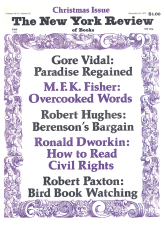In response to:
The Cold War Revisited from the October 25, 1979 issue
To the Editors:
To much of what Arthur Schlesinger, Jr. writes in his review of my Stalin Embattled NYR, October 25). I can take no exception. He finds the detail “often fascinating,” the footnotes “useful,” my reading “wide.” He allows that speculation is “essential” in the field of Stalin studies. He says my thesis (“that Stalin in 1945-1948 was playing domestic politics with his foreign policy”) cannot be dismissed. However, he writes also that the book is “bizarre,” that its speculation is “reckless and unsubstantiated,” and that my Stalin is “hypermachiavellian.” This reveals remarkable ambivalence about Stalin in that period.
The fact of the matter is that not my book, but Stalin’s behavior in the postwar years rates the word “bizarre.” Examples abound: there are the last letters Stalin wrote to Roosevelt; his announcement in mid-1945 that he would soon retire; the extraordinary escalation of his foreign policy demands in the Potsdam period; his arbitrary aggravation of the Iranian crisis early in 1946; his repeated and specific encouragement of European Communists in 1946 to follow new, non-Soviet paths toward socialism; his failure until the last minute in 1947 to advise the European Communists about the Marshall Plan; his artful Cominform meeting in September 1947; his boycotting of the Chinese Communists; his manipulation of the Leningrad leadership; and the arbitrary blowing up of the Berlin crisis in 1948 coincident with his showdown with Tito.
Unfortunately, not much has been written in the West (not to speak of the East) which frontally approaches the problems raised by this behavior. In effect my book is the first study since the 1950s which looks in detail at Stalin in both his domestic and foreign policy roles at the end of the war, and which systematically tries to explain how the “genial” wartime Stalin became the monster, of later years. If the book seems bizarre, even to some sophisticated readers, this is above all because the story is not only odd, but unfamiliar.
Moreover, by the standards of modern Sovietology, the book is not “reckless and unsubstantiated” in its speculation, but methodologically conventional. As Arthur Schlesinger notes in his review, “Western historians [who study Soviet affairs] have to do what they can with what evidence they can uncover.” My opening chapter explains why the’ debates and ideological guidelines consistently published in Pravdu and other Communist publications are respectable evidence. My footnotes tell precisely what evidence has been used. If I had written about a more familiar period of Soviet politics, for example about the Khrushchev era, Professor Schlesinger would hardly have hinted that what Communists say in public is “insubstantial” propaganda, or that it is “reckless” to speculate about disagreements between Communists.
I am sympathetic to Arthur Schlesinger’s doubts. The evidence about Stalin’s politics in 1945 seems doubly strange when it is juxtaposed with the vast stores of conventional documentation about Western policies now available in the American and British archives. Historians ought not, however, to back away from the facts any longer. Khrushchev told us in his “secret speech” in 1956 that there was a good deal of Soviet domestic political activity in the 1945 period. He also specifically documented the intimate linkage of domestic and foreign policy issues (the “sextet-septet” document). In 1946 the Litvinov-Hottelot interview made clear enough the Machiavellian character of Soviet foreign policy then. Finally the judicial murder of N.A. Voznesensky and of Zhdanov’s friends in 1949-1950 demonstrated that the domestic political conflicts of the preceding years were serious.
Under these circumstances there is little room for Professor Schlesinger’s shyness about the nature of my enterprise or for his slurs about my sobriety. He can challenge me all he wants about such specific matters as Soviet perception of Anglo-American conflicts, Jimmy Byrnes’s foreign policy, or the nature of the postwar revolutionary situation. I make no pretense to have solved all the problems of the period. In the present state of the evidence, who could? Let us go forward, however, and probe further into the big puzzles of Soviet postwar policy, not backward into disregard of them.
In general I would like to congratulate Professor Schlesinger on his truly enjoyable and wise review of other recent cold-war literature. As he indicates, it is miraculous how American attitudes about the cold war change. Even a few years ago those books would immediately have been labeled either as hysterical radicalism or as black reaction.
William O. McCagg Jr.
Michigan State University
East Lansing, Michigan
Jr. Arthur Schlesinger replies:
Professor McCagg, in his letter as in his book, usefully points up a number of mysteries in Stalin’s postwar behavior. His solutions to these mysteries are ingenious. I do not find them convincing, but I may be wrong. In the absence of evidence, who can tell?
This Issue
December 20, 1979



